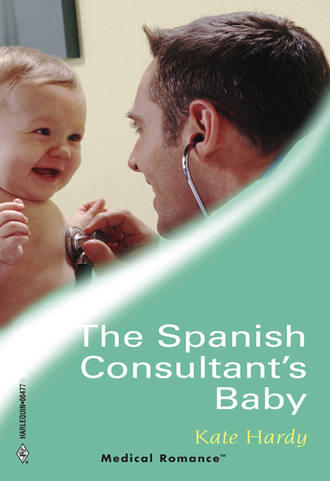
Полная версия
The Spanish Consultant's Baby
To her relief, their meal arrived and the subject changed naturally. ‘An excellent choice,’ Ramón said when he’d tasted the salmon. ‘And Jersey Royals. Mmm. I adore these.’
‘So you’re a foodie?’
‘Foodie?’ He tipped his head on one side. ‘Explain.’
‘It means a gourmet. Someone who likes good food.’
He nodded. ‘Life’s too short not to have the best when you can.’
A quick glance at his wrist told her that he meant it. His watch was a seriously expensive make. Then she noticed that his shirt was silk. And his suit was clearly designer cut. She doubted he could afford them on a doctor’s salary—even that of a consultant—so clearly his family had money, too.
So what was he doing out with her?
This wasn’t a date, she reminded herself. This was just an extension of work. She was obeying Pete’s memo to the letter.
Ramón seemed to sense that she was uneasy because he changed the subject, telling her more about his home city and the children he’d worked with. She’d just started to relax with him when the waiter cleared their plates and brought a small pottery container to the table. He lit a tea-light candle in its centre and Jennifer looked at Ramón. ‘What’s this?’
‘Wait and see.’ Mischief lurked in his eyes.
On cue, the waiter placed a bubbling bowl of white chocolate fondue on top of the tea-light, then brought a platter of tiny sponge cakes and strawberries with two forks, which Ramón appropriated immediately.
‘This is the nearest they had to chocolate and churros.’
‘Spanish pudding?’ she guessed.
‘No, that’s flan—what you would call crème caramel. Or a dish of sweet oranges. But we had a light meal tonight, so I thought we could get away with this.’
Definitely a killer smile, Jennifer thought. She needed coffee. Or a bucket of iced water thrown over her head. Something—anything—to stop the way her knees were turning to jelly, the way her body reacted to this man.
‘Here.’ He speared a strawberry on the long fork, dipped it in white chocolate and held it to her lips. ‘This is perfection.’
All the tables around them were full. They were in the middle of a very public place. So why did it feel so intimate? Why did it feel as if he was the only other person in the city besides her? And why did she feel that he was offering her something more than the strawberry—something much more personal?
The strawberry was definitely a mistake, Ramón thought, because the moment she bit into it, the sensual awareness in her eyes turned to sheer blind panic.
Why was she so afraid? Of him? But surely she knew he would never hurt her? Regretfully, he relinquished the fork. ‘English strawberries have a certain something. It’s like eating sunlight, don’t you think?’
Gradually, the panic in her eyes receded. Though he noticed that she didn’t eat anything else. ‘Do you dislike strawberries?’ he asked.
‘It’s not that. They’re lovely. I’m just…full.’
In other words, he’d pushed her so hard that she’d lost her appetite. And the guilt in turn made him lose his. He ignored the fondue and the cake and just ate the strawberries. ‘Too sweet,’ he said in response to her enquiring glance.
‘I thought all Spaniards had an incredibly sweet tooth?’
He smiled. ‘It’s the Moorish influence. I admit that, yes, I do have a weakness for sticky pastries made with honey. And proper hot chocolate—made the Spanish way.’
She pulled a face. ‘Sounds a bit sickly.’
‘If you have too much, yes. The trick is knowing when to stop.’
Wise advice—but advice that he couldn’t heed. He knew he should stop this now, leave Jennifer be…But he couldn’t. He wanted more. Much more. ‘Coffee?’
‘Not for me, thanks.’
‘Then I’ll see you back to your car.’
‘Ramón, it’s very sweet of you, but there’s no need. It’s perfectly safe.’
‘Even so, I’d prefer to see you safely to your car. Humour me? You could always tell me about the buildings on our way back. Teach me about your city.’
She nodded. ‘Let’s get the bill.’
He was careful to let her pay her way—he knew that if he ignored her feelings now, she’d refuse to come out with him again—and they walked back through the quiet streets to the hospital car park. Jennifer pointed out buildings of note on the way—the church in the market place with stunning stained-glass windows, an art deco shopping arcade, the old toll-house which had once been where the citizens had paid their taxes but was now the tourist information office.
If anyone had asked him what she’d said, he would have just shrugged and said he had no idea. What he’d really noticed had been the way her eyes changed colour, more blue than grey when she was interested in something. The fullness of her lower lip, so promising and so tempting. The way little lines fanned from the corner of her eyes when she smiled. He’d never been so aware of a woman before. He wanted to pull her into his arms, bend her back slightly and kiss her until they were both breathless.
And yet…there had been that panic in her eyes. Jennifer Jacobs was a challenge. A challenge he wanted to meet. To win. Which meant that he had to take it slowly. Softly. Gently.
When they reached her car, he smiled at her. ‘Thank you, Jennifer, for a lovely evening.’
‘That’s OK. Do you want a lift back to your flat?’
He shook his head. ‘It’s a five-minute walk at most. The exercise will do me good.’ He took her hand and drew it to his mouth. Her eyes widened but he held her gaze—he needed her to know that he wasn’t going to hurt her and she was safe with him. Right now, yes, he wanted to kiss her properly. Mouth to mouth. Sliding his fingers into her hair, his tongue against hers, pulling her close against his body so she could feel how much she turned him on. But she wasn’t ready for that and he wasn’t going to force her. He kissed the tips of her fingers, then folded them down into her palm. ‘Goodnight, cariña,’ he said softly.
Jennifer was shaking when she got into the car. She was still shaking as she drove home. Ramón had barely touched her and yet her whole body had reacted to him, reacted to the promise in his dark, expressive eyes. Reacted to the amber sparks of passion he’d let her see, just for a moment, then damped down again as he’d kissed her fingertips.
It was all show. He probably did this to every woman he came into contact with.
Hell, hell and double hell. She really couldn’t let anything happen between them. It would make life too complicated at work. And she didn’t want to be a holiday romance, a brief affair. She didn’t want for ever either. She’d already done that, worn the T-shirt and paid a heavy penance. She wasn’t going to give up her freedom again.
So she’d just have to stay away from him as much as she could.
Friday was easier, as Meg was back and Jennifer managed to avoid Ramón. She was off over the weekend; and although she half expected that Ramón would track her down to her bolthole, he didn’t. She wasn’t sure whether she was more relieved or disappointed.
On the Monday morning she was busy dealing with the handover when he came on duty, and he was already examining a new patient when she’d finished, leaving her free to carry out her normal duties without interruption. But although her mind was definitely concentrating on her job, her body wasn’t. It was too aware of the handsome Spaniard sitting a few metres away in his office.
‘There’s some good news, Mr Garrett. The X-ray results are clear,’ Ramón said.
‘So what’s wrong with Tim?’
‘It is something called Osgood-Schlatter disease.’
‘Disease? It can’t be.’ Garrett shook his head. ‘He only had a knock on the football field. I told him there was nothing broken and he was being a wuss about it.’
Just what he could do without: a pushy parent who wouldn’t put the child’s needs first. Ramón bit back the scorn he would dearly have loved to express, and gently examined the teenager’s leg. ‘Is this painful, Tim?’
‘Not too bad.’
‘Hey. No bravado. On a scale of one to ten, with one being just a little bit and ten being unbearable?’
Tim glanced at his father, then back at Ramón. ‘One.’
That glance told Ramón everything. If only there was some way of getting Mr Garrett out of his office, so Tim had the space to tell the truth. He’d just have to do the best he could. What was it Jennifer had said? You had to sum up the parents, find out how they handled things. Garrett was a know-all. So Ramón would blind him with science.
‘There’s a soft tissue swelling over the tibial tuberosity. This often happens in young athletes during a period of rapid growth. It’s caused by the pull of the quadriceps, which join with the patellar tendons running through the knee into the tibia. When the quadriceps contract, the patellar tendons start to pull away from the shinbone. That causes the pain.’
‘I’d prefer that in English,’ Garrett said cuttingly.
Ramón just about stopped himself scowling. Don’t say the man had something against doctors who weren’t English, too? ‘All right. You see this bump on his shinbone, just below his knee?’
‘It’s just a bump.’
‘It’s inflamed. It hurts when Tim bends or straightens his knee. The muscles in the front of his thigh join to the tendons which connect the muscles to his knee.’
‘So he’s pulled a tendon.’
‘No. It’s partly to do with the growth plates in his bones. When he stops growing, the tendons will become stronger and the pain and swelling will go away.’
‘So what are you saying? That he can’t play football?’
‘Not for a while.’
Garrett made a noise of disgust. ‘That’s impossible. There’s a talent scout coming to the club next week. If Tim doesn’t play, he’ll miss his chance.’
‘If he plays, he could end up with permanent damage to his knees. There will be other chances to see this scout.’
‘Not like this, there won’t! I’ve worked hard for it and I’m not having it ruined by you. I want a second opinion.’
‘By all means you can see Dr Burroughs, but he will tell you exactly the same.’
‘In it together, are you? Well, I want to see someone at the top.’
Ramón gave him a wintry smile. ‘You already are. I’m the consultant.’
‘Then I’ll see your boss.’
Just as Ramón was about to ask Garrett what was more important, his son’s health or football, there was a rap on the door. ‘Dr Martínez? I believe you wanted Tim’s radiography results.’
‘Thank you, Sister Jacobs. I was just explaining to Mr Garrett that Tim has Osgood-Schlatter disease.’ He glanced at the film. ‘There’s calcification within the patellar tendon and irregular ossification of the proximal tibial tuberosity.’
‘Doctors!’ Jennifer rolled her eyes. ‘If you want a translation, Tim, that means the bump at the top of your shinbone isn’t growing properly. But I guess you already knew that.’ She looked at his leg. ‘How long has it been like that?’
‘A month.’
‘A week, tops,’ Garrett cut in.
Ramón and Jennifer exchanged a glance.
‘I’ll refer you to an orthopaedic specialist, Tim,’ Ramón said. ‘For now you need to put ice on your knee for twenty minutes every three to four hours for the next two days. I can give you some anti-inflammatory tablets which will help to deal with the pain. But no sport.’
‘When can I play again?’ Tim asked, with another glance at his father.
‘When you’ve healed. I’d say in two to four months. No deep knee bending, and if you have any more pain you need to stop what you’re doing immediately and rest. Put ice on it, wrap an elastic bandage round it and elevate your leg.’
‘If you overstrain it,’ Jennifer said, ‘your knee will get worse and it will be harder to treat, so it’ll get to the point where you won’t be able to play again. Ever.’ She looked at Garrett. ‘So your son wants to be a professional footballer?’
‘He’s supposed to be playing in front of the talent scout next week.’
‘Sorry, Tim. That’s rotten luck.’ She patted his shoulder. ‘But if you rest your leg now, you’ll be in a better position to see the talent scout in six months’ time.’
‘Doesn’t anyone around here understand how important next week is?’ Garrett demanded.
‘Yes. But I’m sure you’ll agree—as Tim’s coach, I presume?—that his health is more important. Everyone recovers from injury at a different rate, but if he goes back too soon it could lead to permanent damage. So isn’t it better to wait for six months and give him a chance than to go for next week and risk Tim not playing up to his usual game and maybe wrecking his knee for good?’ Jennifer asked.
‘This is ridiculous,’ Garrett said. ‘I knew we should have gone private.’
‘A private hospital would have told you exactly the same as Dr Martínez,’ Jennifer said. ‘Tim needs to wait until his knee’s no longer tender before he even thinks about going back onto the football field.’
‘As his coach, you can help by making sure he has a proper warm-up routine, especially for his thigh, hamstring and calf muscles,’ Ramón said. ‘When he can straighten and bend his knee without pain, jog without limping and finally jump without pain, then he can go back into training.’
‘I can’t believe this.’ Garrett looked ready to thump something. The wall, a desk—or perhaps the doctor who stood before him.
‘Let me take you into my office for a cup of coffee,’ Jennifer said with a warm smile. ‘It’s quieter there and it’ll give you time to take it all in while Dr Martínez straps up Tim’s leg.’
For a moment Ramón thought Garrett was about to refuse. But then he sighed, nodded and followed Jennifer out of the room.
Without his father’s presence, Tim was more truthful about the pain and how long it had been going on. By the time Tim’s leg was strapped up, Garrett returned.
‘I, um, want to apologise. About earlier. I didn’t mean to be rude. I was worried about my boy,’ he said gruffly.
‘No problem,’ Ramón said. ‘But you need to stick to the regime until Tim is well again.’
‘I know. R-I-C-E,’ Garrett said. ‘Rest, ice, compression, elevation. I am a qualified trainer, you know.’
Which made it even worse in Ramón’s eyes. As a professional, Garrett should know not to push his son’s body beyond its limits. But now wasn’t the time for censure. ‘Good luck. And if you have any worries, come back and see me,’ Ramón said. ‘The orthopaedics team will be in touch in the next week.’
Once the Garretts had gone, Ramón went in search of Jennifer. ‘Thank you,’ he said. ‘Are you a mind-reader?’
‘No. He was pretty loud,’ Jennifer said. ‘And I thought someone ought to step in to stop you two killing each other.’
‘I would never resort to violence,’ Ramón said haughtily.
‘I was speaking metaphorically.’
‘Sorry. I owe you an apology, as well as thanks.’
She shrugged. ‘I can handle alpha males.’
‘Alpha males?’
‘Big and bossy,’ she elaborated.
He grinned. ‘So what did you do to Garrett?’
‘Listened,’ she said. ‘I had a hunch.’
‘And?’
‘Sometimes,’ Jennifer said, ‘people want to live the lives they never had through other people.’
Ramón folded his arms. ‘And…?’
‘He’d missed out being talent-spotted at Tim’s age, so he wanted to make sure that Tim had the chances he never had.’
‘Even if Tim doesn’t really want to be a professional footballer?’
‘Toby just needs time to think about it.’
‘Toby?’
‘Tim’s father.’
Oh. So they were on first-name terms already? Jealousy twisted in Ramón’s gut. No way was he letting that bully loose on his Jennifer.
‘Anything you wanted in particular? I have some obs to do,’ Jennifer said.
‘Of course.’ He paused. ‘But I want to thank you properly. Have lunch with me?’
‘Thanks, but there’s really no need. I was just doing my job.’
Her voice was quiet but determined. He realised that if he insisted now, he’d lose her. But he wasn’t going to give up. He was just going to take a different route. And he knew exactly where to start.
CHAPTER FOUR
THE next morning, Jennifer opened her desk drawer to find a neatly wrapped box sitting on top of her roster sheets. Odd. It wasn’t her birthday and any presents from grateful parents were always shared among the ward staff. Frowning, she looked at the card. The bold black script simply said, ‘Gracias. R.’
When she undid the ribbon and removed the paper, she discovered a box of very exclusive chocolates. Her favourites. Ones she never bought herself. The only person who ever bought them for her was Meg, at Christmas and for her birthday.
Why was Ramón buying her chocolates? Or had he done it for all the ward staff? No, surely not—he’d only been with them a week, and she hadn’t heard that he was cutting his secondment short.
She got the chance to ask him three hours later, when she was sitting with Sophie, an eight-year-old girl who had had a tonsillectomy, and teaching her how to draw horses.
‘Buenas días, señorita,’ Ramón said with a broad grin. ‘And how’s my favourite girl today?’
Jennifer stared at him in shock. He couldn’t possibly be this blatant! But, no…of course not. He was talking to their patient.
‘How are you feeling today, Sophie?’
‘My throat’s sore,’ Sophie croaked. ‘And Sister JJ made me eat toast for breakfast.’
‘For a good reason, I assure you,’ Ramón told her. ‘And that’s a very good picture you’ve drawn.’
‘Sister JJ’s teaching me. Look—she drew a sketch of me, too,’ Sophie said, passing the sketchbook to Ramón.
He glanced at the book. ‘A woman of hidden talents. I didn’t know you could draw so well, Sister Jacobs.’
There had been a time when she’d intended to make her career in art. But that had been a long, long time ago. Another world. In the days BA—Before Andrew. ‘Um, it came in handy for my exams.’
As if he sensed how embarrassed she was, he changed the topic. ‘Sophie, while I’m here I may as well check your throat, see how you’re healing,’ he said.
Sophie nodded. ‘I just open my mouth and say, “Ah”?’
‘That’s right.’ He smiled, and placed a depressor gently on her tongue so he could shine a light down her throat. ‘Good. Very good. I think that calls for jelly and ice cream today, Sister Jacobs.’
‘I’ll make a note of it.’ Jennifer smiled at the girl. ‘And I’d better go and see some of my other patients before Dr Martínez tells me off.’
‘He won’t do that,’ Sophie said confidently. ‘He’s too nice.’
‘Why, thank you, señorita.’ Ramón gave her a formal bow.
Jennifer left the cubicle. ‘Dr Martínez, may I have a word, please?’
‘It’s Ramón,’ he reminded her.
She flushed. ‘I just wanted to say thank you for the chocolates.’
‘Pleasure,’ he said. ‘You helped me out of a sticky situation yesterday. I wanted to show my appreciation.’
‘Anyone else on the ward would have done the same.’
‘No. Only you,’ he said softly. ‘Will you have lunch with me today?’
‘No.’
‘I know, you don’t like being obligated. How about if you buy me lunch, so I’m the one who’s obligated?’
‘No.’
‘Dinner?’
‘You don’t give up, do you?’ Jennifer asked.
He smiled. ‘I always get what I want in the end.’
Her eyes narrowed. ‘Is that a threat?’
‘No, cariña, it’s a promise,’ he said softly.
His words sent a shiver down her spine, and she wasn’t sure whether it was one of pleasure or just plain fear. Why couldn’t he see that she wanted to be left alone, in her quiet, comfortable life—just her and her cat?
‘Why are you wearing those? They look ridiculous with that dress. Don’t you know anything? Go and put some proper shoes on—ones with high heels.’
She recognised that look on his face. He’d had a bad day. Someone had answered him back. And he was going to make himself feel better in the way he knew best. Putting her down. She knew all that…but it didn’t stop it hurting.
‘Come on, come on, we’re going to be late! I told you to be ready.’
Ready for another business dinner. Another dinner where she’d know nobody—though if she talked to anyone, he’d want to know exactly what she’d said. What the conversation had been about. Whether she’d shown him up or flirted or…
‘Don’t you ever listen to a word I say?’
Yes. Of course she did. But where had her attentive lover gone? The man who’d wanted to cherish her when they’d first met, put her on a pedestal. The one who loved music, who enjoyed wandering through art galleries hand in hand with her. The one who’d said he knew he was too old for her and should give her a chance to meet someone her own age who could make her happy, but he loved her too much to let her go. Where had he gone? And just when had this hurtful, critical impostor taken his place?
Keen to avoid a row, she rushed upstairs to change her shoes. And then wished she hadn’t a couple of moments later.
‘What’s this? Sketching?’ She felt a familiar churning in her stomach as she heard the paper slap onto the table. ‘I hope you’re not thinking about going to college or getting a job.’
‘I was just sketching, that’s all. For me,’ she said softly.
‘They’re not bad. But they’re not up to art-school standard. You’d just be wasting your time, trying to get in. I’m only thinking of you, Petal. How hard it would be to face rejection. You wouldn’t even get an interview at one of the studios. You’re not good enough.’ Not good enough. Not good enough…
Jennifer woke with a cry. She sat up straight, drawing her knees up to her chest and wrapping her arms round her legs. She hadn’t dreamed of Andrew for months. Hadn’t heard his voice criticising everything she did. She’d used the wrong polish on the table. There were smears on the windows. Not enough salt—or too much—in whatever she cooked. He didn’t like her friends—they were leading her into bad ways and she was easily led. Not good enough, not good enough, not good enough…
She shuddered. She knew why it was all coming back to her. Ramón. Handsome, Spanish…and determined to have his own way. Just like Andrew had been. Somehow she had to make him back off. She was no longer mousy little Jennifer, scared of being on her own and being found wanting by the world. She’d grown up, changed. She was thirty-two years old, working in a senior position in a career she loved. And she was just fine on her own. Tomorrow she would make Ramón understand.
Though she didn’t get the chance. They were both so busy that she barely had time for a lunch-break. And then he caught her in the corridor. ‘Jennifer, I know you’re busy, but could you spare me five minutes, please?’ Clearly her doubts showed on her face because he said, ‘It’s work. Do you have much experience with cystic fibrosis?’
‘Some. How old’s the patient?’
‘Six months.’ He sighed. ‘And the parents have taken the news badly. You know better than I do what kind of help is available locally.’
‘OK. I’ll come now.’
She followed him into his office.
‘Mr and Mrs Stewart, this is Jennifer Jacobs, our senior sister in Paediatrics,’ Ramón said.
Mrs Stewart had clearly been crying.
‘Sister Jacobs, the Stewarts were concerned about little Keiran—he had a big appetite but never seemed to put any weight on,’ Ramón explained. ‘The health visitor noticed that his height and weight crossed three trend lines on the chart, and he’s always had a troublesome cough and slight wheezing. Mrs Stewart had mild asthma as a child and went to her GP to see if that was the problem with Keiran, and the GP sent them here for a sweat test.’
The sweat test, Jennifer knew, was one of the best ways of checking for cystic fibrosis. The child’s skin was covered with a chemical called pilocarpine which made him sweat, and the area was covered with gauze and wrapped in plastic for thirty minutes to collect the sweat. Until very recently, babies hadn’t been screened at birth. Although now the ‘Guthrie test’ blood sample collected at a week old was also used for testing for cystic fibrosis, Keiran had clearly slipped through the net.









